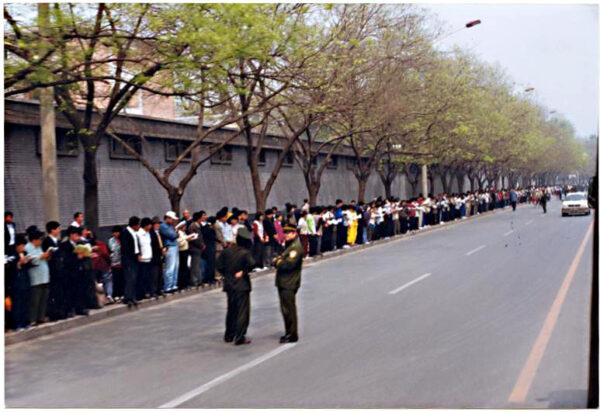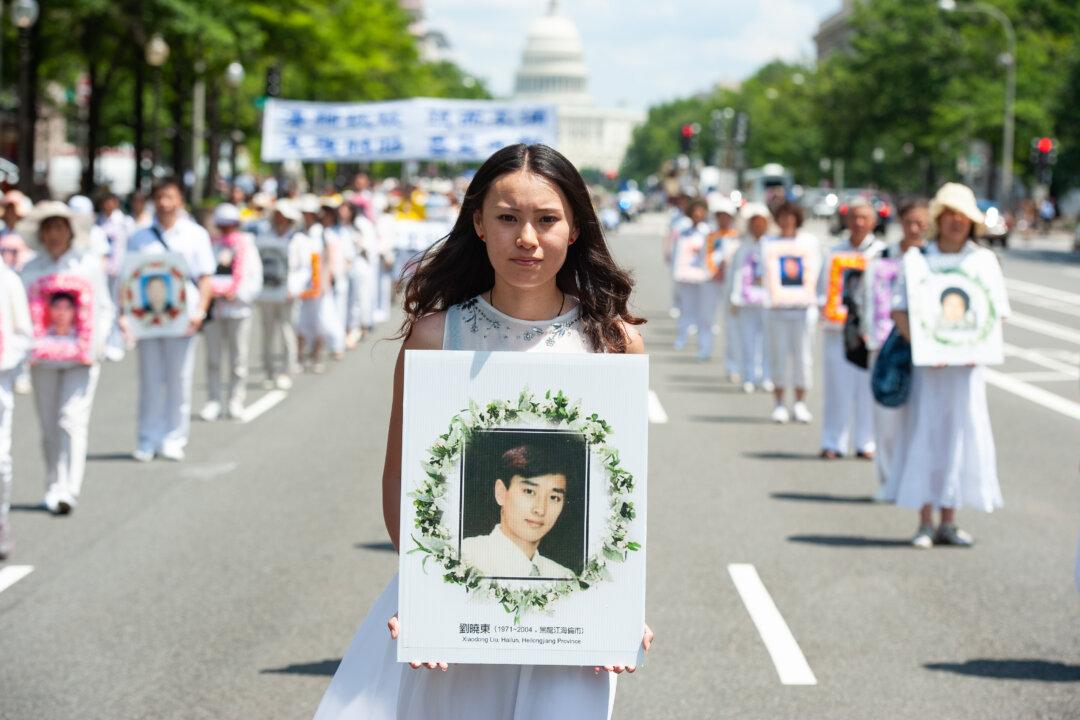For an estimated 70 million to 100 million Chinese, April 25, 1999 was a day that changed everything.
Twenty-one years ago, about 10,000 adherents of the spiritual practice Falun Gong gathered in front of the appeals office near Zhongnanhai, the Communist Party headquarters in Beijing. They lined up in neat rows on the sidewalks to plead with authorities to grant them an environment where they could practice their beliefs without fear. They didn’t wave banners or posters, nor shout slogans. Most quietly did meditative exercises.
A national magazine had just published a report slandering the practice. Dozens of their fellow practitioners had been arrested and jailed two days before in the nearby city of Tianjin, after they went to the government office and asked for a correction to the magazine article. The central government had also announced that Falun Gong books would be prohibited from publication or circulation nationwide.
Kong Weijing, then a 49-year-old banker in Beijing, had prepared for the worst as she walked toward Zhongnanhai at 7 a.m. that cloudy morning to join the appeal.
It was the largest demonstration in mainland China since the massacre at Tiananmen Square in June 1989.
Memories of tanks rolling into Tiananmen Square and troops opening fire on pro-democracy protesters, killing hundreds or thousands of unarmed people, were still fresh in the minds of most Chinese people.
“Anything could happen, but I felt a personal obligation” to join the appeal, she said in an interview. “When Dafa is smeared, as someone who has benefited from the practice, you just have to say something.” Remembering the “rioting” charge slapped on students who peacefully sat in Tiananmen Square a decade earlier, Kong put on her banker uniform and brought identification with her.
“I believed that [the authorities] would do the right thing after they learned the facts,” she said.
Kong, like many other Falun Gong adherents, couldn’t have imagined that in July 1999, the Chinese regime would launch a sweeping persecution campaign, rounding up hundreds of thousands and throwing them into detention centers, forced labor camps, and brainwashing centers, where they have routinely been tortured.
Kong recalled that the April 25 appeal was quiet and calm. The Chinese regime would later describe it as a “siege” of the central government, in order to justify a nationwide suppression.

On the sidewalk of Fuyou Street, the street leading up to the compound, she saw students, teachers, farmers, and workers lined up seemingly for miles. A mother carried her daughter in her arms. A father pushed a baby stroller. They formed long rows along the walls, reading books or doing meditative Falun Gong exercises. Volunteers made rounds to collect trash from people. Ample room was left for bikes to pass through.
Zhu Rongji, then the Chinese prime minister who advocated for economic reform, came out to meet the practitioners. Kong was one of the few that Zhu randomly picked to come inside to deliver the group’s requests, which included the release of the Tianjin practitioners and the lifting of the publication ban. While inside, she relayed the requests to officials from the national petition office and the Party’s central office, and handed them a pocket-sized version of “Zhuan Falun,” the main book of the practice.
In a few hours, the Tianjin practitioners were released. By 9 p.m., the practitioners outside were notified that the regime had agreed to their requests, and so Zhu and everyone else packed up and left.
But less than three months later, on July 20, 1999, the regime initiated its bloody persecution of the practice. This included a massive propaganda drive, with state broadcaster CCTV airing continuous anti-Falun Gong programs to its hundreds of millions of viewers, for months.
Not long after, Kong’s workplace froze her pension fund and was instructed to hold brainwashing sessions forcing Kong and others to renounce their faith.
Kong fled to other parts of the country and, for nearly a decade, couldn’t return home. She housekept for her acquaintances in exchange for lodging, sometimes staying in each place for only days at a time.
In June 2000, to counter newspaper reports that the practice had been eradicated, Kong went to do exercises in Tiananmen Square, hoping to show everyone they were unshaken by the suppression. The police arrested her almost immediately and put her into detention for more than 10 days. She refused to give her name and staged a hunger strike, so the guards forced a tube down her throat to feed her.
“We have our ways to know [your name],” the guards told her. “We could put a paper on your nose and suffocate you to death,” Kong recalled them saying.
Fearing repercussions for their son, her husband asked for a divorce in 2000, although police harassment of her family didn’t cease in the following years, and officers continued to try to track down her whereabouts.
“He thought that we could remarry after the persecution ends,” Kong said. “When I apologized for not being able to give him a welcoming family, he told me not to worry about him ... and to keep up on my practice.”
“My college friend told me that when [the regime] speaks in disapproval of something, it must be something good,” she said.
Minghui.org, a U.S.-based clearinghouse dedicated to chronicling the persecution, has recorded the deaths of 4,406 practitioners in the persecution, which is still ongoing. It noted that the data is only the “tip of the iceberg,” due to the extensive censorship and challenges of obtaining information in China.
Following years of drifting about, Kong came to the United States in 2015 to visit her son, who works in New York, and took refuge.
“Only then did I really have the dignity of a human being,” she said.





